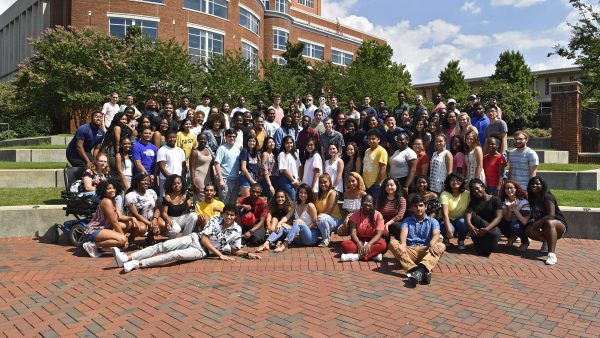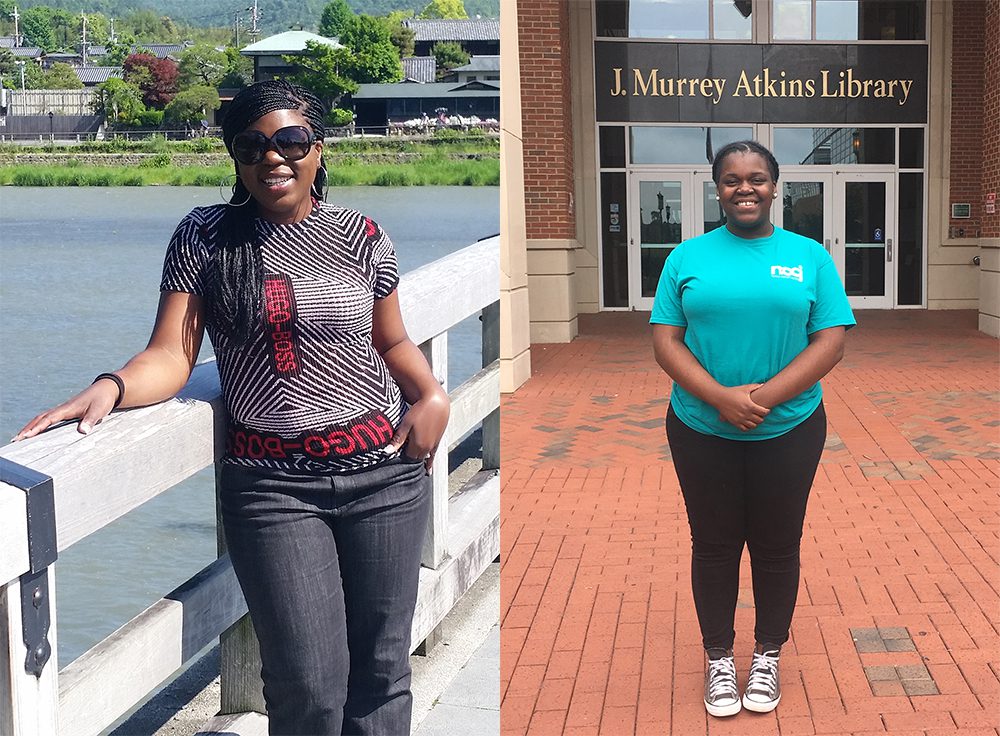UTOP Cements Success

Karen Lumbu Kinard ’11 admits leaving her close-knit family in Greensboro to attend college at UNC Charlotte was nerve-wracking. But the warm welcome she received from the University Transition Opportunities Program (UTOP) eased her tension.
“Had I not gotten that chance to immerse myself during the summer prior to my freshman year, I’m not sure how my Charlotte experience would have been,” she said. “UTOP staff are very welcoming, very friendly, very supportive.”
So when Kinard’s younger sister, Grace Lumbu, decided to enroll at UNC Charlotte, Kinard encouraged her to attend UTOP, which for 33 years has been helping underrepresented students adjust to college life.
“You cannot go to UNC Charlotte without going through UTOP,” Kinard told her sister.

Karen Lumbu Kinard ’11 and Grace Lumbu
The sisters are among scores of alumni who credit the program, offered through the Office of Academic Diversity and Inclusion, with a successful start at UNC Charlotte. Now UTOP hopes to help even more students kickstart their UNC Charlotte experience.
This semester, a crowdfunding campaign was initiated to help UTOP students offset fees to attend the summer program. UTOP costs include summer tuition and fees for seven credit hours, housing and a $250 UTOP participant fee, said Shawn Simmons, UTOP program director.
The program offers scholarships and grants for tuition and housing, but the $250 fee is a burden for a lot of UTOP participants. Many of the students come from households where the expected family contribution is zero.
“The $250 participant fee is another charge that families have to come up with in addition to high school graduation costs, prom costs, orientation fees and all other costs associated with finishing high school and transitioning to college,” Simmons said. “With the support of UTOP alumni and others through the crowdfunding campaign, we are hoping that particularly alumni will donate $250 to sponsor at least one student to cover their participant fee for the program.”
Herman Thomas, professor emeritus of Religious Studies, initially founded UTOP in 1986 to increase retention and graduation rates for African American students enrolled in the University. Today, UTOP is open to students of all backgrounds, but the program continues to recruit students from underrepresented populations, Simmons said.
And its tactics are working.
“Research from the past decade indicates that students who participate in UTOP were retained after one year at a rate nearly 11 percent higher than underrepresented students who did not attend the program, and almost 13 percent higher than all first-time freshmen,” Simmons said.
“The percentage of UTOP students who graduated after six years was more than 11.5 percent higher than underrepresented students who did not participate and 10 percent higher than all first-time, full-time freshmen.”
Kinard came to UNC Charlotte because she wanted a comprehensive education as well as a place where she could explore. She always did well in science classes and her parents encouraged her to become a doctor.
Kinard thought she wanted to go to medical school but was unsure about being a doctor. She was positive that she wanted to help people. At UNC Charlotte, she earned degrees in biology and public health.
“UNC Charlotte gave me the best of both worlds,” said Kinard, who went on to receive a master’s degree in health science, with a concentration in environmental health/population health, from Johns Hopkins University. She now works for the U.S. Public Health Service.
Initially, Kinard was unsure about giving up her summer to attend UTOP. Her parents made the decision for her and she’s glad they did. UTOP provided a foundation to build upon that alleviated pressure once her freshman year started in the fall.
In addition, her professors knew her name and she already had a network of friends. She also met her husband, Kurtis Kinard ’10 (photo right), in UTOP.
Kinard fondly remembers UTOP staff such as Jodi Douglas-Turner, now assistant director of the Office of Academic Diversity and Inclusion. Douglas-Turner provided support throughout her time at UNC Charlotte, putting her in contact with tutors when she struggled with physics and making her aware of scholarship opportunities.
“She’s very straightforward, very direct,” Kinard said. “She tells you what you need to do and what you need to know to excel.”
Lumbu always looked up to her big sister. Kinard’s academic and professional success—as well as the quality of UNC Charlotte’s engineering program—played a big part in Lumbu’s decision to follow in Kinard’s footsteps.
“I felt like UNC Charlotte would be the best fit to help me grow as a student and be successful as an engineer,” said Lumbu, a member of the class of 2023.
Thanks to UTOP, Lumbu felt prepared for her fall semester. She’s grateful for the credits she earned during the program and the friends she made. She feels at home at UNC Charlotte.
“It’s like a sense of unity, of family,” Lumbu said of UTOP. “Even after the program is over, it provides a safe space.”